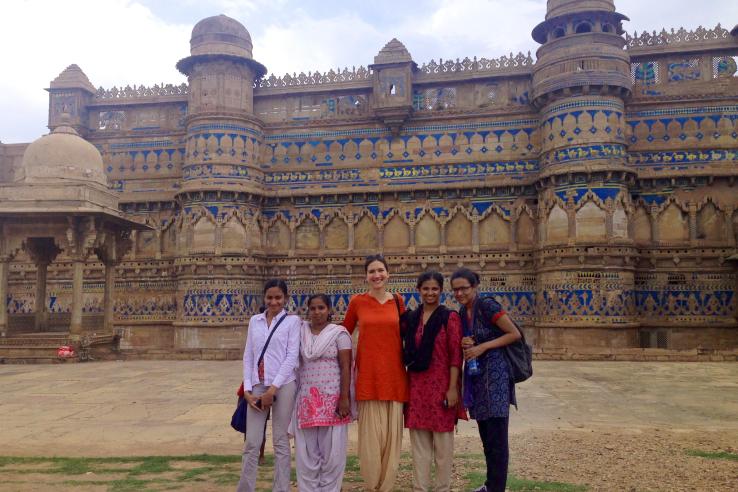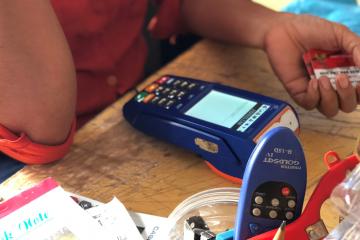
Affiliate Spotlight: Simone Schaner on lessons learned from advancing evidence-based policy

Simone Schaner is an associate professor (research) of economics at the University of Southern California and co-chair of the Inclusive Financial Innovation Initiative. Simone’s interests revolve around decision-making processes within households, especially related to financial access, health care, and labor markets.
As an undergraduate, Simone Schaner initially planned on going into medicine. She quickly realized, however, that studying social problems of poverty and inequity were more compelling to her. “I thought—and still think—that economics offers a particularly useful framework for rigorously engaging with complex, challenging issues that affect well-being.”
Since then, Simone has put this perspective into practice. Her research, which largely focuses on financial inclusion, household decision-making, and women in labor markets, is motivated by a policy-focused approach. Now an associate professor (research) of economics at the University of Southern California, Simone considers how her research can inform both policy and economic theory. “I believe we learn a lot more when we think with both those hats on,” Simone says.
This is especially true when it comes to financial inclusion, which she views as fundamental to alleviating poverty. Simone applies a behavioral economics lens to help identify barriers to financial inclusion, as well as inform the design of policies and products to overcome those barriers. Similarly, Simone says, “with the rapid growth in digital financial services in many emerging economies, I also see significant potential for behavioral economics to inform consumer protection initiatives.”
Simone’s extensive work in the field of financial inclusion and her experience conducting research in Indonesia led to her being named co-chair of J-PAL Southeast Asia’s Inclusive Financial Innovation Initiative (IFII). Working closely with J-PAL staff, Simone ensures priority research topics and results reach relevant audiences to inform decision-making on urgent policy questions.
From her time leading IFII and charting a path for greater evidence use in policymaking, Simone has gleaned two crucial insights.
First, given the complicated constraints and incentives policymakers often operate under, “delivering the right message at the wrong time, or with the wrong framing, can be counterproductive,” Simone says. A deep understanding of policy dynamics and the needs and preferences of different stakeholders is essential to effective evidence dissemination.
Second, once a partnership emerges, being an active partner for the duration of a research project is key to sustaining it. To Simone, this means sharing learnings with policymakers and implementers along the way, especially for impact evaluations with long timelines to which new partners may not be accustomed.
Beyond her commitment to policy-oriented research and partnerships, Simone aims to center study participants and partners in her research. “All my work studies groups of people who live in very different cultural and economic environments than my own,” Simone says. “I believe it’s important to invest time and effort in understanding their perspectives and lives as best as I possibly can.” To do so, she grounds her projects in qualitative work, and is in frequent communication with those involved, including her in-country research teams.
This deep-seated understanding of the importance of local knowledge and expertise comes from Simone’s experiences conducting fieldwork in Kenya for her doctoral dissertation. During a day of scoping work to identify barriers to saving, she encountered a couple who invited Simone and her team in for tea and avocados. Following a lively conversation about saving and personal development, the husband decided to organize a community focus group with his neighbors for Simone, which proved to be helpful for her research.
“I am always amazed by how generous many people are with their time, especially when they’re managing a lot of complex problems in their daily lives,” Simone says. “It’s important that as researchers we are mindful and respectful of this.”
Research in Action: Empowering Migrant Workers to Access Quality Overseas Placement Services
The challenge: In many countries, migrant workers depend on recruitment agencies to help them find work abroad. However, the quality of these agencies can vary widely, and many engage in exploitative practices that leave workers vulnerable to abuse. The problem is exacerbated by a lack of information available to potential migrants about the quality of different agencies. Providing potential migrants with information about agency quality could help improve working conditions and encourage better practices among placement agencies.
The research: From 2015 to 2018, Simone and her coauthors conducted a randomized evaluation across 400 villages in Indonesia to investigate the effects of providing information about the quality of migration agencies to potential migrants. Potential migrants were randomly assigned to receive agency report cards with rankings and/or attended information sessions about choosing a high-quality agency. Simone and her coauthors conducted surveys before and after the intervention to measure the impact of the different information delivery techniques on migrant workers, non-migrants, and local sponsors who connect migrants to agencies.
The results: Initial results show that giving prospective migrants more information about the quality of job placement agencies slows down the migration rate. At the same time, the experiences of those who do migrate improve. This suggests that when prospective migrants can better tell good agencies apart from bad, they raise their standards, effectively spending more time searching for a better provider, and thus delaying their migration. Read the evaluation summary, with updated results forthcoming.


